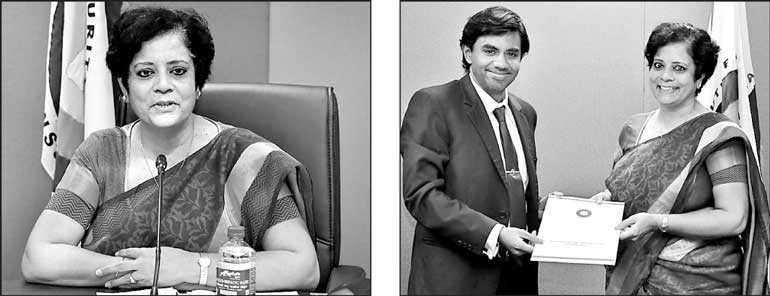Monday Feb 23, 2026
Monday Feb 23, 2026
Saturday, 2 March 2019 00:00 - - {{hitsCtrl.values.hits}}

Dr. Geeta Madhavan, Advocate and President and Founder of Chennai-based think tank International Law and Strategic Analysis Institute (ILSAI) spoke on ‘Election 2019 and the Role of Dravidian Parties on the National Policies and the Impact on Sri Lanka Relations’ at Institute of National Security Studies Sri Lanka on 7 February.
She presented her analysis to an audience of highly-distinguished academics, researchers, members of the diplomatic core, and officials from the Foreign Ministry, and representatives from the tri forces of Sri Lanka: Army, Navy and Air Force. Dr. Geeta Madhavan delivered her lecture at the invitation extended to her by the Director General Prof. Asanga Abeyagoonesekara.
Dr. Geeta Madhavan set the context for her lecture by explaining the fall of the Congress party during its second term in politics by failing to deliver executive action due to poorly constructed decisions.
She then spoke of the change in government to Modi led Barathiya Janatha Party (BJP) of India. She recalled the expected change was that BJP would bring in an era of BJP governance as once under Atal Bihari Vajpayee. Dr. Madhavan described Vajpayee as an erudite and gentleman politician.
Unfortunately the Modi-led BJP government failed to deliver their promises due to disastrous decision of de-monetisation that was supposed to address three main issues that had plagued India: black money, terrorism and corruption. When nothing changed, and the government enthused with a strong Hindu nationalism, it eroded established constitutional structures which threatened the secularism values of India.
The above issues have presented a frightening image to the minority population of India (around 25% of the population) which is a sizeable constituency in a country of nearly 1.7 billion people. She spoke about Tamil Nadu in particular which is a federal state with a proud Dravidian Culture and heritage. The people of Tamil Nadu feel ignored and threatened by the strong Hindu nationalist rhetoric and are unhappy that issues pertaining to Tamil Nadu are not addressed by the BJ government at the Centre.
India’s elections and the formation of the government at the Centre, according to Geeta Madhavan are a numbers game. The Five Southern States and the Union Territory namely: Telangana, Andhra Pradesh, Karnataka, Kerala, Tamil Nadu and Pondicherry have indicated they would most likely vote out the BJP-led alliance which is reinforced by the anti-Modi “save India” campaign of Mamta Banerjee of West Bengal.
Tamil Nadu is currently in crisis owing to several highly contentious matters: Constitution Amendment Bill to provide 10% reservation to economically backward, centralised education and national eligibility entrance exams (NEET) for medical and engineering schools, environmental poisoning by the Sterlite Copper plant in Thoothukudi, Neduvasal protest on hydrocarbon extractions, and devastation of crops after the Gaja Cyclone.
Geeta Madhavan explains “economically backward is a condition but socially backward is a terrible anathema, to equate the two is a dangerous thing”. She highlights how this negatively impacts on social upliftment and speaking of these issues would help the DMK win instead of the AIDMK which is currently allied with the BJP; mainly because the BJP is seen by the voters of Tamil Nadu as an anti-Tamil party.
The crux of her argument is the issues in Tamil Nadu and the Centre-periphery disconnect are so problematic to the extent, the DMK alliance would rather concentrate on raising issues concerning Tamil Nadu at the Centre and would not be inclined to bring up Indo-Lanka issues for discussion. At least in the short term this alliance would not make a direct impact on Ind0-Lanka relations.
While fringe parties such as that of Vaiko’s would make noise, irrespective of their concerns on Sri Lankan issues the Dravidians “have no time to shed tears for others”, when their issues are of greater immediate concern.
The participants at the discussion raised questions on the fishermen issue of the Palk Straight, that has soured Indo-Lanka relations but Geeta Madhavan opine this would not strain the bi-lateral relations as long as there are resilient and practical solutions and initiatives from both sides.
Another question was on the citizenship issue for Sri Lanka Tamils that have sought refuge in India, which Geeta Madhavan points out, is not as grave as the current Rohingya Crisis or Afghan refugee crisis. She highlighted the only Indian Parliamentarian to have raised the need for a Refugee Bill to deal with the constant refugee inflow into India was Shashi Tharoor, to no avail. She warns in the future, the government will need a coherent law on refugee management in the likely event of spread of Rohingya refugees all over India and the dangers of them being infested with radical ideology.
Her final remarks were on the idea that India is misconceived as a regional hegemon. She opine that Indian military modernisation and expansion of the Navy is to protect India’s interests in the Indian Ocean and India’s exclusive economic Zone (EEZ) and not for a showdown with China.
India according to Geeta Madhavan remains a cooperative state and future elections in India would not bring in drastic change in Indo-Sri Lanka relations. The Indian establishment is a democracy with no hegemonic designs.